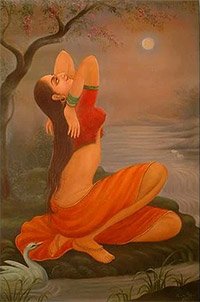Tandulakusumavalivikara, Taṇḍulakusumavalivikāra, Tandulakusumavali-vikara: 1 definition
Introduction:
Tandulakusumavalivikara means something in Hinduism, Sanskrit. If you want to know the exact meaning, history, etymology or English translation of this term then check out the descriptions on this page. Add your comment or reference to a book if you want to contribute to this summary article.
In Hinduism
Kama-shastra (the science of Love-making)
Source: Shodhganga: Elements of Art and Architecture in the Trtiyakhanda of the Visnudharmottarapurana (kama)Taṇḍulakusumavalivikāra (तण्डुलकुसुमवलिविकार) refers to one of the “sixty four kinds of Art”, according to the Kāmasūtra of Vātsyāyaṇa.—Indian tradition, basically includes sixty four Art forms are acknowledged. The references of sixty four kinds of kalā are found in the Bhāgavatapurāṇa, Śaiva-Tantras, Kāmasūtra of Vātsyāyaṇa etc.—Taṇḍula means rice and kusuma means flower. The art form taṇḍulakusumavalivikāra denotes creating various designs with coloured rice grains and flowers for decorating mansions or temples.

Kamashastra (कामशास्त्र, kāmaśāstra) deals with ancient Indian science of love-making, passion, emotions and other related topics dealing with the pleasures of the senses.
See also (Relevant definitions)
Partial matches: Vikara.
Full-text: Kusuma, Tandula, Valivikara, Rice, Flower, Decorating.
Relevant text
Search found 1 books and stories containing Tandulakusumavalivikara, Taṇḍulakusumavalivikāra, Tandulakusumavali-vikara, Taṇḍulakusumavali-vikāra; (plurals include: Tandulakusumavalivikaras, Taṇḍulakusumavalivikāras, vikaras, vikāras). You can also click to the full overview containing English textual excerpts. Below are direct links for the most relevant articles:
Vishnudharmottara Purana (Art and Architecture) (by Bhagyashree Sarma)
3. A General Note on Art < [Chapter 1 - Introduction]